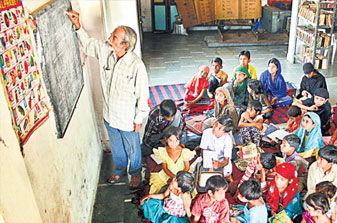
It is 10 am sharp when Kavita, 13, reaches the school in Khajrana. The teacher may have been impressed with her punctuality, but quickly draws attention to her unkempt hair.
Tidiness is among the many lessons this sprightly teenager from the slums of Khajrana and 84 of her schoolmates are being taught at Indori’s Paathshala.
The school takes its name from Aziz Indori, 80, who scripted an education revolution in the heart of Madhya Pradesh’s commercial capital.
After retiring from the city’s Islamia Karimia Degree College in 1995, Indori took up the task of educating poor Muslim children. The doors of his school are, however, open to children from other communities also.
The retired Urdu teacher is a bundle of energy despite his age. His experiment with 10 children has blossomed in the last two decades. The two-storey school now accommodates eight times its original number of students going right up to Class 8. The school is not affiliated to any board, but the curriculum has been well thought through and gives the children of the local daily wage earners a shot at a better life.
Kavita recites multiplication tables up to 4, while her junior Anamika (another Hindu student) writes the English alphabet with a flourish. Daily wage earner Ghulam Mohammed, father of Firoz, 11, who studies in the school says, “I could not study much, but did not want my child to loiter on the roads. Given my means, I could not afford to educate him… then one day I came across Indori sahib’s school.”
Indori, a doctorate in Urdu, derives immense satisfaction from his work. “I have always stood for the education of the poor. Rich have the means and resources. Who cares for the poor?”
Indori chacha, as he is known to his students, says, “I want to break this tradition in the Muslim community that the child of a cart-puller will be a cart-puller.”
MP’s slide in the Annual Status of Education Report (ASER) 2011-12 — the largest survey of what children across the country are learning — makes Indori’s effort more praiseworthy. According to the report released in January, attendance in primary schools (Classes 1 to 5) of MP has dipped to 54.5% in ’11 from 67% in ’07.
Till date, Indori has not involved any politician or religious leader in his project. “It is with the help of 4-5 friends that I’m running this project.” His Muscat-based brother-in-law, Dr Abdul Rashid, donated the building that houses the school.
With age catching up, Indori has roped in two persons to care for the students. “One is paid Rs. 800 and the other R1,200 per month by my friends.”
The students, who make do with well-worn clothes, are provided stationery and winter clothing — all for a nominal fee of R20 per month. With no examination system, students are judged according to their daily progress. The system has worked. Nearly 20 of the school’s students have gone on to complete their matriculation, some of them from a state-run school in the locality.
An alumnus of the school, Parveen, who studied up to Class 10, says, “I am thankful to Indori chacha.” Parveen, who is getting married today, also got the opportunity to learn tailoring, and contribute to her family’s earnings, at another Indori initiative — the Jan Shikshan Sansthan. This is Indori’s effort to provide vocational training to girls in the slum. The programme already has more than 75 trainees.
Indori says, “I feel satisfied. I wanted to educate and make poor Muslim girls self-reliant. I didn’t want them to get just a degree, but also knowledge.”
source: http://www.hindustantimes.com / Hindustan Times / Home> / by Vijay Swaroop, Hindustan Times / Indore – May 03rd, 2012








